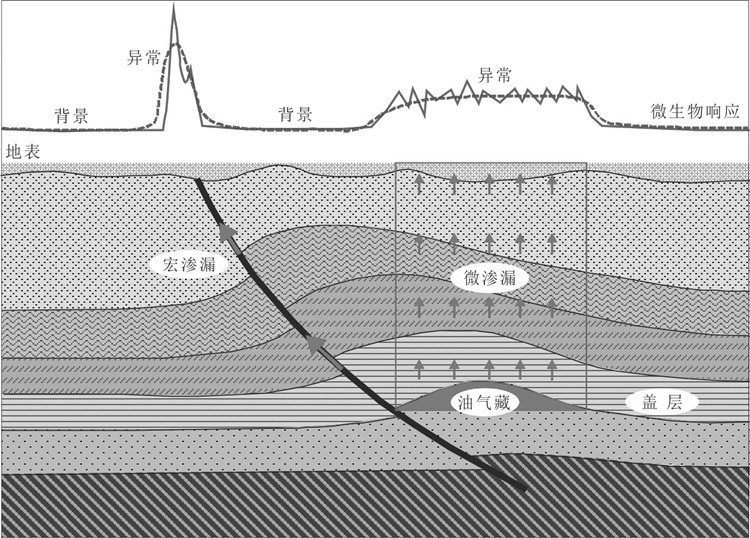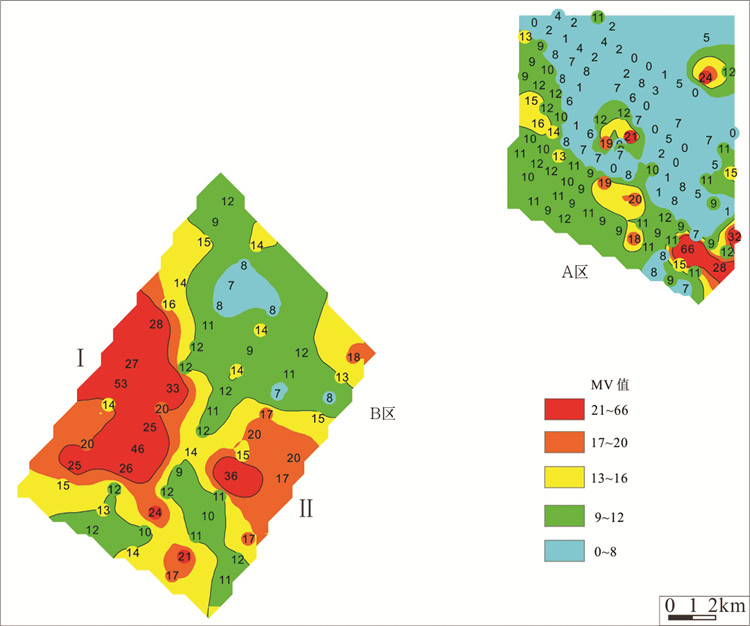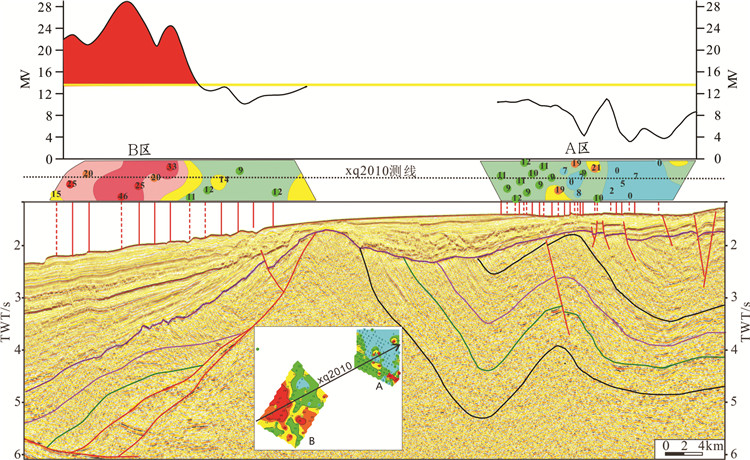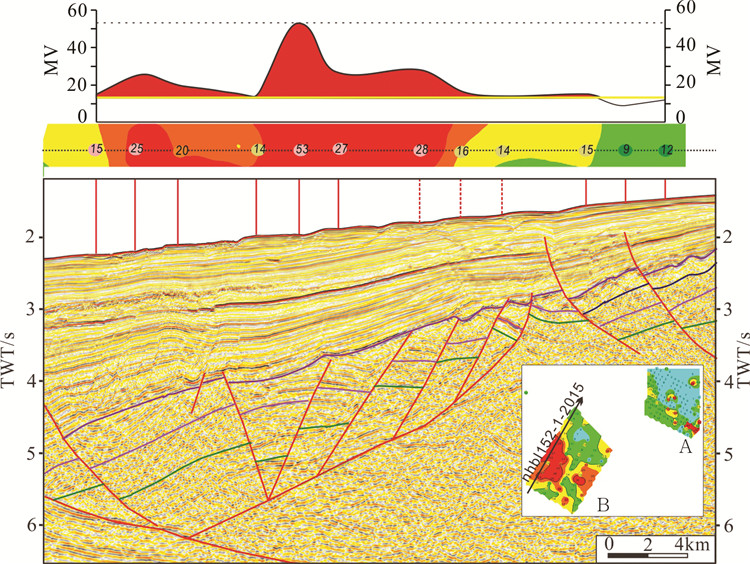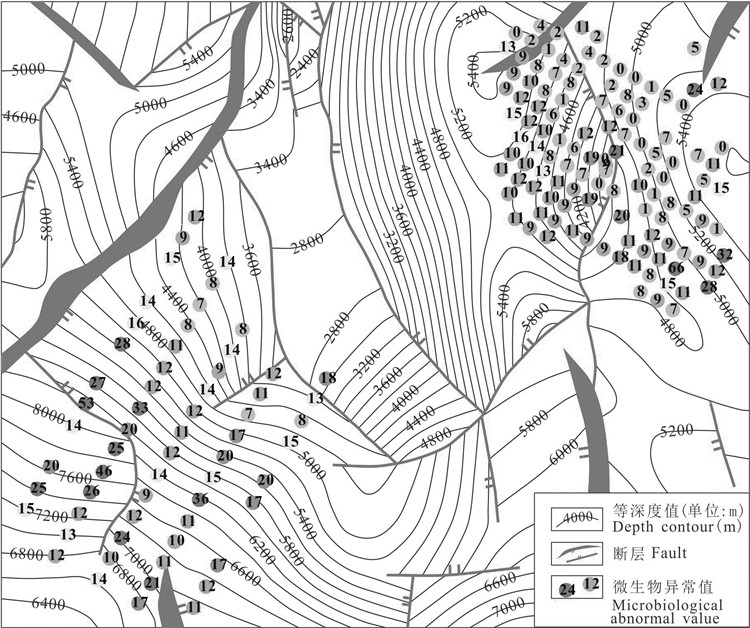The application of microbial exploration technology to the oil and gas survey of Chaoshan depression
-
摘要:
东沙海域潮汕坳陷中生界研究程度相对较低,油气分布规律不明,为了加强对该区油气分布和富集规律的研究,针对潮汕坳陷西部地质目标首次应用微生物地球化学勘探技术(MGCE),探讨其含油气性。MGCE技术以轻烃微渗漏理论为基础,采用地质微生物学方法和地球化学方法检测研究区海底表层的微生物异常和吸附烃异常,预测研究区下伏地层中油气的富集区及其油气性质。检测结果显示研究区西部凹陷的斜坡区微生物异常呈块状发育,轻烃微渗漏强度变化大,可能为潜在油气富集区,酸解吸附烃成果显示可能的油气性质为干气和凝析油气。
Abstract:Oil and gas exploration of Mesozoic strata in Chaoshan depression of Dongsha sea area is believed to have good prospect. Because of its low exploration and study level caused by the limitation of seismic data, oil and gas distribution there is unknown. In order to strengthen the research on the distribution and enrichment of oil and gas in the west of Chaoshan depression, the authors first applied microbial hydrocarbon detection technology to study its oil-bearing property of geological targets. Based on the theory of light hydrocarbon microseepage, the authors used the method of geological microbiology and geochemistry directly detect the anomaly of microbes and adsorbed hydrocarbons on the surface of the study area, and predicted the enrichment area of oil and gas in the underlying strata of the study area as well as its oil or gas properties. The results of microbial hydrocarbon detection show that microbiological anomaly is massively developed in the slope area of the western depression, suggesting that the intensity of light hydrocarbon micro seepage is relatively large in the study area, and there may be oil and gas enrichment zone. Acidolysis hydrocarbon analysis shows possible existence of oil and gas properties for dry gas and condensate oil and gas. The results of microbial hydrocarbon detection indicate that the Mesozoic strata in the Dongsha sea area has a good potential for oil and gas resources.
-
-
图 2 烃类微渗漏与宏渗漏模式图(据郝纯等,2015修改)
Figure 2. Pattern of microseepage and macroseepage of hydrocarbon (modified from Hao Chun et al., 2015)
表 1 研究区微生物异常区异常统计
Table 1 Statistical table of microbiological anomaly area

-
Brown A. 2000. Evaluation of possible gas microseepage mechanisms[J].AAPG Bulletin, 84 (11):1775-1789. http://www.wanfangdata.com.cn/details/detail.do?_type=perio&id=7572db5f3edf23b7581a2f9374f4abbb
Dietmar Schumacher. 2012. Hydrocarbon microseepage-A significant but underutilized geologic principle with broad applications for oil/gas exploration and production[C]//AAPG European Regional Conference.
Ding Li, Wu Yubing, Liu Fenfen. 2018. Microbiological and geochemical exploration for hydrocarbon reservoirs in volcanic rocks of zhongguai uplift[J]. Special Oil and Gas Reservoirs, 25(4):24-28. http://d.old.wanfangdata.com.cn/Periodical/tzyqc201804005
Hao Chun, Sun Zhi Peng, Xue Jianhua. 2015. The application prospect of microbial geochemical exploration technology for hydrocarbon detection in deep water area of South China Sea[J]. China Petroleum Exploration, 20(5):54-62.
He Jiaxiong, Chen Shenghong, Ma Wenhong, Gong Xiaofeng. 2012.The evolution, migration and accumulation regularity of oil and gas in Zhujiangkou basin, northeastern South China Sea[J]. Geology in China, 39(1):106-118(in Chinese with English abstract). http://www.wanfangdata.com.cn/details/detail.do?_type=perio&id=zgdizhi201201011
He Lijuan, Zhang Yingchao, Mei Hai. 2015. Applying microbial geochemical exploration technology for hydrocarbon detection of Lingshui sag in deep water area of Qiongdongnan basin[J]. China offshore oil and gas, 27(4):61-67. http://www.wanfangdata.com.cn/details/detail.do?_type=perio&id=zghsyq-gc201504008
Hitzman D O. 1959a. Prospecting for petroleum deposits[P].USA Patent: 2880142, 203231.
Hitzman D O. 1959b. Prospecting for petroleum deposits (detecting hydrocarbon consuming bacteria colonies by artificial hydrocarbon nutrient culturing)[P]. U.S. Patent, 3880142.
Hitzman D C, Tucker J D. 1994. Offshore trinidad survey identifies hydrocarbon microseepage[C]//Offshore Technology Conference, 65-72.
Jones V T, Burtell S G. 1996. Hydrocarbon flux variations in natural and anthropogenic seeps[J]. AAPG Memoir, (66):203-221. http://www.wanfangdata.com.cn/details/detail.do?_type=perio&id=8029b693ddc0fdb3af05a41ae6a1d99c
Klusman R W, Saaed M A. 1996. Comparison of light hydrocarbon microseepage mechanisms[J]. Hydrocarbon Migration and its Near-surface Expression, 157-168. http://cn.bing.com/academic/profile?id=ca204b0dd6755bb7cabf352265df74cf&encoded=0&v=paper_preview&mkt=zh-cn
Lin Renzi, Mei Hai, Mei Bowen. 2009. The preliminary practice and application prospect of microbial oil-gas detection technologies[J]. Marine Geology Letters, 25(12):36-42. http://www.wanfangdata.com.cn/details/detail.do?_type=perio&id=10.1002/bio.2341
Matthews M D. 1996. Importance of sampling design and density in target recognition[J]. AAPG Memoir, (66):242-253 http://cn.bing.com/academic/profile?id=155d49a819abb702e21c84b46084abab&encoded=0&v=paper_preview&mkt=zh-cn
Mei Bowen, Yuan Zhihua, Wang Xiuheng. 2002. Microbiological prospecting of oil and gas[J].China petroleum exploration, 7(3):42-53. http://cn.bing.com/academic/profile?id=68ff87301def89cafed561f81ab21e40&encoded=0&v=paper_preview&mkt=zh-cn
Mei Hai, Lin Renzi, Mei Bowen. 2008. Microbial oil-gas detection technologies:Theory, practice and application prospect[J]. Natural Gas Geoscience, 19(6):888-893. http://d.old.wanfangdata.com.cn/Periodical/trqdqkx200806026
Mirza Omer Ahmed Baig, Kamran Aziz, Moin Raza Khan. 2017.Application of microbial geochemical exploration survey to help reducing the risk of hydrocarbon accumulation and charge——a case study from the kirthar foldbelt, south Pakistan[C]//Annual Technical Conference & Oil Show, 243-250.
Moqilewskii G A. 1938. Microbiological investigation in Connecting with gas Surveying[J]. RazvedkaNedr, 8(1):59-68.
Qiang Kunsheng, Zhang Guangxue, Zhang Li, Lü Baofeng, Zhong Guangjian, Feng Changmao, Yi Hai, Zhao Zhongquan, Yang Zhen, Yan Wei. 2018. A study of depositional characteristics of the Jurassic strata in Chaoshan Subbasin, northern South China Sea, and its control on reservoir beds[J]. Geology in China, 45(1):48-58(in Chinese with English abstract). http://www.wanfangdata.com.cn/details/detail.do?_type=perio&id=zgdizhi201801005
Qiang Kunsheng, Zhang Guangxue, Zhang Li, Liu Baofeng, Zhong Guangjian, Feng Changmao, Yi Hai. 2018. Paleogeomorphic features and sedimentary facies model of Jurassic strata in Chaoshan sub-basin, northern South China Sea[J]. Geology in China, 45(6):1251-1258(in Chinese with English abstract). http://d.old.wanfangdata.com.cn/Periodical/zgdizhi201806015
Saunders D F, Buraon K R, Thompson C K. 1999. Model for hydrocarbon microseepage and related near-surface alterations[J]. AAPG Bulletin, 83(1):170-185. http://www.wanfangdata.com.cn/details/detail.do?_type=perio&id=376c522b10032bcfa766c2539cf946fd
Schumacher D, Hitzman D C, Tucker J. 1997. Applying High Resolution Surface Geochemistry to Assess Rservoir Compartmentalization and Monitor Hydrocarbon Drainage[C]//Institute for the Study of Earth and Man, Applications of Emerging Technologies: Unconventional Methods in Exploration of Petroleum and Natural Gas V. Dallas: Southern Methodist University Press, 309-322.
Thrasher J, Fleet, A J, Hay S J, Hovland M, Dueppenbecker S. 1996.Understanding geology as the key to using seepagein exploration:The spectrum of seepage styles[J]. Hydrocarbon Migration and its Near-Surface Expression:AAPG Memoir, (66):223-241. http://archives.datapages.com/data/specpubs/memoir66/17/0223.htm
Tucker J, Hitzman D C. 1994. Detained microbial Survey help improve reservoir characterization[J].Oil & Gas Journal, 92 (23):65-69. https://www.researchgate.net/publication/236361169_Detailed_microbial_surveys_help_improve_reservoir_characterization
Yan Chengzhi, Shi Hesheng, Pangxiong. 2014. Applying a technique microbiological geochemistry to hydrocarbon exploration in Baiyun sag deep water area[J]. China Offshore Oil and Gas, 26(4):15-19(in Chinese with English abstract). http://www.wanfangdata.com.cn/details/detail.do?_type=perio&id=zghsyq-gc201404003
Yuan Zhihua, Wang Ming. 2010. Study of fault block Qi-81 in the Western end of Gangxi structure of the Huanghua depression by using microbial anomalies[J]. Geology and Exploration, 46(6):1106-1111(in Chinese with English abstract). http://d.old.wanfangdata.com.cn/Periodical/dzykt201006017
Zhang Chunlin, Pang Xiongqi, Mei Hai. 2009. Identification of microseepage from macro-seepage and exploration practice in Changling Longwangou area of Zhenba block[J]. Natural Gas Geoscience, 20(5):794-800(in Chinese with English abstract).
Zhang Chunlin, Pang Xiongqi, Mei Hai. 2010. Application of microbial oil surveying to exploration of lithologic gas reservoirs:a case from Sanhu depression, Qaidam basin[J]. Petroleum Exploration and Development, 37(3):310-315. http://cn.bing.com/academic/profile?id=87924990e4da79545e6727f74af9c5e5&encoded=0&v=paper_preview&mkt=zh-cn
Zhao Zhongquan, Zhong Guangjian, Feng Changmao. 2016. Cenozoic sequence stratigraphy and seismic facies analysis of Xisha Trough Basin in northern South China Sea[J]. Marine Geology & Quaternary Geology, 36(1):15-26(in Chinese with English abstract). http://www.wanfangdata.com.cn/details/detail.do?_type=perio&id=hydzydsjdz201601002
Zhu Weilin. 2009. Some key geological issue on oil and gasexploration in the northern deepwater area of the South ChinaSea[J]. Acta Geologica Sinica, 83(8):1059-1064(in Chinese with English abstract).
Zhuo Haiteng, Wang Yingmin, Xu Qiang, Li Dong, Wang Ying, Wang Yongfeng, Li Hua, Tang Wu. 2014. Classification and genesis of continental slopes on the northern South China Sea[J]. Acta Geologica Sinica, 88(3):327-336. http://www.wanfangdata.com.cn/details/detail.do?_type=perio&id=dizhixb201403003
丁力, 吴宇兵, 刘芬芬. 2018.中拐凸起火山岩油气藏微生物地球化学勘探研究[J].特种油气藏, 25(4):24-28. doi: 10.3969/j.issn.1006-6535.2018.04.005 郝纯, 孙志鹏, 薛健华. 2015.微生物地球化学勘探技术及其在南海深水勘探中的应用前景[J].中国石油勘探, 20(5):54-62. doi: 10.3969/j.issn.1672-7703.2015.05.006 何家雄, 陈胜红, 马文宏, 龚晓峰2012.南海东北部珠江口盆地成生演化与油气运聚成藏规律[J].中国地质, 39(1):106-118. http://geochina.cgs.gov.cn/geochina/ch/reader/view_abstract.aspx?file_no=20120111&flag=1 何丽娟, 张迎朝, 梅海. 2015.微生物地球化学勘探技术在琼东南盆地深水区陵水凹陷烃类检测中的应用[J].中国海上油气, 27(4):61-67. http://d.old.wanfangdata.com.cn/Periodical/zghsyq-gc201504008 林壬子, 梅海, 梅博文. 2009.油气微生物勘探技术的初步实践及其应用前景[J].海洋地质动态, 25(12):36-42. doi: 10.3969/j.issn.1009-2722.2009.12.006 梅博文, 袁志华, 王修垣. 2002.油气微生物勘探法[J].中国石油勘探, 7(3):42-53. doi: 10.3969/j.issn.1672-7703.2002.03.008 梅海, 林壬子, 梅博文. 2008.油气微生物检测技术:理论、实践和应用前景[J].天然气地球科学, 19(6):888-893. doi: 10.11764/j.issn.1672-1926.2008.06.888 强昆生, 张光学, 张莉, 吕宝凤, 钟广见, 冯常茂, 易海, 赵忠泉, 杨振, 鄢伟. 2018.南海北部潮汕坳陷侏罗系沉积特征及对储层的控制作用研究[J].中国地质, 45(1):48-58. http://geochina.cgs.gov.cn/geochina/ch/reader/view_abstract.aspx?file_no=20180105&flag=1 强昆生, 张光学, 张莉, 吕宝凤, 钟广见, 冯常茂, 易海. 2018.南海北部潮汕坳陷侏罗系古地貌特征及沉积相模式[J].中国地质, 45(6):1251-1258.. http://geochina.cgs.gov.cn/geochina/ch/reader/view_abstract.aspx?file_no=20180614&flag=1 鄢全树, 石学法, 刘季花.2015.南海中-新生代火成岩岩石地球化学特征:约束南海构造演化[J].地质学报, 89(z1):226-227. http://d.old.wanfangdata.com.cn/Conference/8771720 颜承志, 施和生, 庞雄. 2014.微生物地球化学勘探技术在白云凹陷深水区油气勘探中的应用[J].中国海上油气, 26(4):15-19. http://d.old.wanfangdata.com.cn/Periodical/zghsyq-gc201404003 袁志华, 王明.黄骅. 2010.坳陷港西构造西端歧81断块微生物异常研究[J].地质与勘探, 46(6):1106-1111. http://d.old.wanfangdata.com.cn/Periodical/dzykt201006017 张春林, 庞雄奇, 梅海. 2009.烃类微渗漏与宏渗漏的识别及镇巴长岭-龙王沟地区勘探实践[J].天然气地球科学, 20(5):794-800. http://d.old.wanfangdata.com.cn/Periodical/trqdqkx200905025 张春林, 庞雄奇, 梅海. 2010.微生物油气勘探技术在岩性油气藏勘探中的应用——以柴达木盆地三湖坳陷为例[J].石油勘探与开发, 37(3):310-315. http://www.wanfangdata.com.cn/details/detail.do?_type=perio&id=syktykf201003008 赵忠泉, 钟广见, 冯常茂. 2016.南海北部西沙海槽盆地新生代层序地层及地震相[J].海洋地质与第四纪地质, 36(1):15-26. http://www.wanfangdata.com.cn/details/detail.do?_type=perio&id=hydzydsjdz201601002 朱伟林. 2009.南海北部深水区油气勘探关键地质问题[J].地质学报, 83(8):1059-1064. doi: 10.3321/j.issn:0001-5717.2009.08.001 卓海腾, 王英民, 徐强, 李冬, 汪莹, 王永凤, 李华, 唐武. 2014.南海北部陆坡分类及成因分析[J].地质学报, 88(3):327-336. http://d.old.wanfangdata.com.cn/Periodical/dizhixb201403003



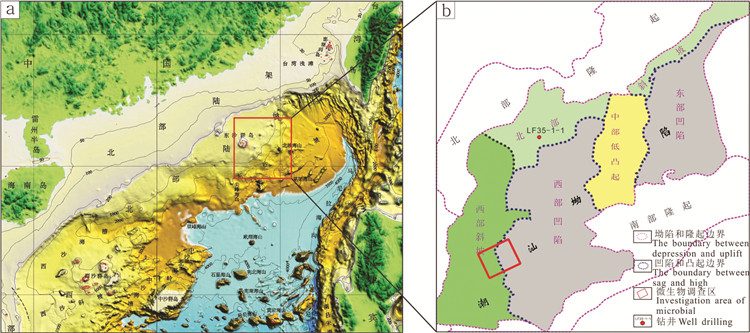
 下载:
下载:
